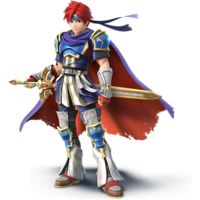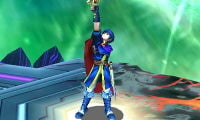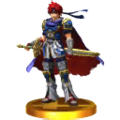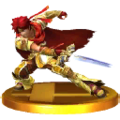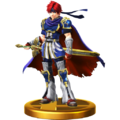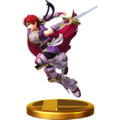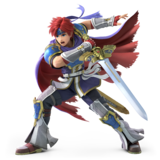Roy
- For Roy's fighter info, see Roy (SSBM), Roy (SSB4), and Roy (SSBU). For other characters with the same name, see Roy (disambiguation)
| Roy | |
|---|---|
Roy
Official artwork of Roy from Fire Emblem: The Binding Blade. | |
| Universe | Fire Emblem |
| Debut | Super Smash Bros. Melee (first appearance in a video game, 2001) Fire Emblem: The Binding Blade (first appearance in the Fire Emblem series, 2002) |
| Smash Bros. appearances | Melee Brawl SSB4 Ultimate |
| Most recent non-Smash appearance | Fire Emblem Echoes: Shadows of Valentia (via amiibo, 2017) |
| Console/platform of origin | Nintendo GameCube, Game Boy Advance |
| Species | Human |
| Gender | Male |
| Place of origin | Elibe |
| Designed by | Eiji Kaneda |
| Voice actor | Jun Fukuyama |
| Article on Fire Emblem Wiki | Roy |
Roy (ロイ, Roy) is the protagonist of Fire Emblem: The Binding Blade, the sixth game in the Fire Emblem series of tactical role-playing games. His debut in Super Smash Bros. Melee along with Marth increased global interest in the series, prompting future titles to be released internationally from the seventh installment onwards.
Character description
While HAL Laboratory obliged to include Marth as a playable character in Super Smash Bros. Melee by popular Japanese demand, the sixth installment of Intelligent Systems' long-running Fire Emblem fantasy tactical-RPG series, Fire Emblem: The Binding Blade, was nearing the end of its development. Masahiro Sakurai decided to include Roy, The Binding Blade's protagonist, as a playable character despite the game releasing after Melee, though it was intended to be released prior and he was not aware of its release date plans. It was a successful ploy to Japanese audiences for both Melee and The Binding Blade, but since this involved a game franchise never distributed outside of Japan beforehand, Nintendo was wary of keeping the unfamiliar fantasy swordsmen in Melee in its overseas releases, but decided to keep them in based on the approval of western gamers and him being "fun."[1] Marth and Roy became popular enough in Melee that the Fire Emblem franchise gained international attention from the gaming community.
Intelligent Systems followed up with the franchise's seventh installment, known in Japan as Fire Emblem: The Blazing Sword but whose North American version is simply titled "Fire Emblem" to keep international releases in mind. To this end they made it a prequel to The Binding Blade, set in the same Fire Emblem universe and chronology twenty years before Roy's quest and starring Roy's father Eliwood, whose somewhat older resemblance to Roy was meant to appeal to players of Melee. The game's story is laid out with ten introductory chapters starring one of Eliwood's allies, Lyn, meant to introduce players to the Fire Emblem style of tactical play, with the other 20+ chapters containing the main story. Though it is a prequel, The Blazing Sword is structured so that no knowledge of The Binding Blade is required to understand its story.
Roy, in the tradition of Fire Emblem protagonists, is an upstanding and thoughtful fifteen year-old young man in The Binding Blade with a natural proclivity to help and support others, and while he would prefer to avoid blood-shed, he maintains a strong resolve to see peace return to the continent of Elibe, the medieval high-fantasy setting of both games. Unlike most young protagonists, however, he is perceptive and cunning for his age, such as tricking a traitorous vassal in his group into exposing himself, and he often reacts calmly and tactically to disturbing news. Roy is also quite oblivious to the obvious feelings that some of the women in his army develop for him. Also steeped in series tradition is that his in-game unit is the only one belonging to the Lord character class, giving him initially shaky base stats but allowing him to become a high-performance unit by the game's end. He has no particular flaws apart from his late promotion, but his defenses are somewhat low.
Roy is studying in the province of Ostia, away from his home province of Pherae, both of which are in the nation of Lycia, when the militant nation of Bern begins to conquer various other nations on the continent; as his father Eliwood has fallen ill, Roy is entrusted with leading Pherae's army alongside the other armies of the Lycian League against Bern and its ruler, Zephiel, who displays a mysterious thirst for world domination. Zephiel's errant younger sister, Princess Guinivere, escapes Bern and comes to Roy in defiance of her brother's motives, hoping to negotiating a treaty with Lycian nobility. Roy quickly agrees to her proposal to search for a peaceful means to end Bern’s aggression, and it is in part this encounter that will eventually lead him on a journey across Elibe to save the continent from what could end up being a war with powerful dragons from a different dimension. He is ultimately successful in his endeavors when he defeats Zephiel. However, if all the legendary weapons of Elibe were gathered by meeting certain conditions in-game, the weapons would start glowing and pointing toward the location of the Demon Dragon, Idenn, the game's true final boss. A few extra chapters take place which results in the defeat of Idenn. Afterward, depending on certain in-game factors, different characters experience slightly different endings, but generally peace returns to Elibe and everyone lives happily ever after, with various rebuilding of respective countries.
After nine years of absence, Roy eventually reappeared as a playable character in the Nintendo 3DS game Fire Emblem Awakening via SpotPass and DLC as an Einherjar. He later appeared in Fire Emblem Heroes as a summonable legendary hero and Fire Emblem Echoes: Shadows of Valentia via amiibo as an illusory unit.
In Super Smash Bros. Melee
Roy makes his Smash-series debut (and by extension, his debut in any game) as an unlockable character in Melee. He can be battled to be unlocked one of two ways: beating either Classic or Adventure as Marth on any difficulty, or playing 900 Vs. mode matches. His appearance is based on his design from Fire Emblem: The Binding Blade.
Roy fights with his sword, the Sword of Seals, which is used in most of his attacks, excluding grabs and throws, with his special moves all involving the sword's fiery powers. In contrast to Marth's Falchion, the Sword of Seals is most powerful near the hilt of the blade rather than the tip, and has a multitude of fire-based attacks. His neutral special move, the Flare Blade, is a chargeable sword strike like Marth's Shield Breaker, but it can be charged for up to five full seconds, after which it will unleash an explosive attack so powerful that many opponents would be instantly KO'd, and Roy receives 10% damage as a side effect. His side special move, the Double-Edge Dance (DED), is a series of up to four sword slashes determined by the number of times B is pressed and which direction the control stick is pressed during each swipe, like Marth's Dancing Blade. Roy's up special move, Blazer, is a slower, more damaging, fire-based version of Marth's Dolphin Slash, and his down special, Counter, operates similarly to Marth's Counter, being a bit harder to time while having potentially higher or lower damage and knockback; the retaliatory sword swipe's power and knockback is based on those of the opponent's attack, multiplied by 1.5, making it very quick at KOing a character like Ganondorf using his Warlock Punch.
Roy is a clone of Marth in that they feature pretty much the same movement and attack style, but their specifications are different. Roy seems at first to be a slower and stronger version of Marth, but he is actually almost the opposite; he has a relatively fast dash, a fast and long dash-dance, and a fast fall speed that gives speed to his short hop aerials almost as well as Marth, and his Double-Edge Dance is very useful in battle, but his moves actually do rather low damage, and it is hard to land his primary KO move, his forward smash. It has been determined that Marth can KO better with his swordplay, which has a sweet spot on the tip of the sword, while Roy's sweet spot is more on the hilt. Roy's forward smash and Flare Blade are decent at edgeguarding, and Roy has a great grab range like Marth and has a potentially effective move in his Counter, but it is his lack of a projectile, short recovery, and easiness to be juggled and combo'd, added with his low general damage and notably bad hitbox placements on his sword-based attacks, that ultimately make Marth the better fighter.
Roy and Marth were a primary subject of the "tier wars" at GameFAQs that lasted between 2003 and 2004, determining which among these two very similar fighters were the better character, and in the end Marth won out over Roy by a very large margin as demonstrated by the current tier list. Today Roy is considered an inferior clone of Marth in Melee, but he has a loyal fanbase nonetheless.
Trophies
In line with the other playable characters, Roy as a playable character is featured on three trophies - a normal trophy acquired by beating the Classic mode with Roy on any difficulty, and Smash Red and Smash Blue trophies are won beating the Adventure and All-Star modes, respectively. His classic mode trophy reads as follows:
- Roy
- The son of the lord of Pharae Principality, Roy was studying in Ostia when the Kingdom of Bern invaded League of Lycia. His father fell ill at this time, so Roy assumed lordship of Pharae's armies. After his fateful meeting with the Princess Guinevere, his destiny became inextricably linked with the fate of the entire continent.
- Fire Emblem (Japan Only)
In Super Smash Bros. Brawl
Roy is one of the five playable characters in Melee who did not return as a playable character in Brawl. His only appearance in the game is as a sticker of his official artwork from Fire Emblem: The Binding Blade. Roy is also referenced in the title of Winning Road - Roy's Hope, an included theme from his game that can play on the Castle Siege stage.
Unfinished data
While Roy does not appear as a playable character in Brawl, data of what appears to be the character has been uncovered through hacking, as ef_roy.pac. The exact reason why the data is included is unknown, though it is commonly believed that Roy was planned to be included as a playable character, before being cut for unknown reasons. Of particular note is that the data for Roy includes his own unused fanfare, as "snd_bgm_Z39_FROY", further indicating that he was intended to be playable in Brawl.
Sticker
| Name | Game | Effect | Characters |
|---|---|---|---|
| Roy | Fire Emblem: The Binding Blade |
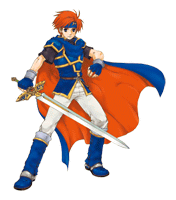 Roy (Fire Emblem: The Binding Blade) |
In Super Smash Bros. 4
Roy again did not return as a playable character in the base version of Super Smash Bros. 4. In mid-April 2015, Roy's presence as downloadable content was leaked in datamining of the 1.0.6 update. He was ultimately released as DLC on June 14th, 2015. His design was changed to his appearance as a Master Lord in Fire Emblem: The Binding Blade, while adding elements from his artwork as an Einherjar from Fire Emblem Awakening. His moveset underwent drastic changes in his transition from Melee, having been buffed and partially reworked as a semi-clone of Marth.
Marth has an alternate costume based on Roy's original outfit. The rearranged song Winning Road - Roy's Hope from The Binding Blade returns from Brawl in Super Smash Bros. for Wii U.
Roy's inverse-tipper mechanic means he is less reliant on spacing compared to Marth, yet also means he must get dangerously close to opponents to strike with his sword's sweetspot. He received some noteworthy buffs from Melee to SSB4, with improved mobility being the best example, with increased running speed and among the fastest air speed in the game. The introduction of rage also benefits Roy's already heavy-hitting moves. However, he also received direct and indirect nerfs, due to the removal of wavedashing and L-cancelling weakening his approach, as well as decreased hitbox range on his attacks. Roy currently places 42nd out of 55 on the SSB4 tier list, earning average tournament results.
Trophies
- Roy
Roy, the main character of Fire Emblem: The Binding Blade, returns for the first time since Melee! In The Binding Blade, Roy led the troops of Pherae into battle in his ailing father’s stead, and now he brings his speed and talent for short-range combat into this game. His sword, the Sword of Seals, is uniquely powerful at the base of the blade.
Roy, the main character of Fire Emblem: The Binding Blade, returns for the first time since Melee! In The Binding Blade, Roy led the troops of Pherae into battle in his ailing father’s stead, and now he brings his speed and talent for short-range combat into this game. His sword, the Sword of Seals, is uniquely powerful at the base of the blade.
- Roy (Alt.)
Flare Blade creates an explosion in front of Roy that can be charged by holding down the button. Take care, though, because at the highest levels of charge, Roy himself will catch fire and take damage! His side special, Double-Edge Dance, changes for each strike after the first depending on whether you hold up or down while attacking.
Flare Blade creates an explosion in front of Roy that can be charged by holding down the button. Take care, though, because at the highest levels of charge, Roy himself will catch fire and take damage! His side special, Double-Edge Dance, changes for each strike after the first depending on whether you hold up or down while attacking.
In Super Smash Bros. Ultimate
Roy, alongside the entire playable cast of the series, is playable in Super Smash Bros. Ultimate.
Trivia
- Even after the Fire Emblem games started seeing overseas releases, Roy remains one of the few playable characters to still speak Japanese in the Super Smash Bros. series in Western localizations of the game, with the others being Marth and Cloud. He would be later voiced in English by Ray Chase in Fire Emblem Heroes.
- However, starting with Super Smash Bros. Ultimate, Marth is now voiced in English by Yuri Lowenthal. Roy's case, however, is unknown.
- Roy's official artwork pose for both Melee and SSB4 resembles his neutral pose as a Great Lord with the Sword of Seals in Fire Emblem: The Binding Blade.
References
|
| |
|---|---|
| Fighters | Marth (SSBM · SSBB · SSB4 · SSBU) · Roy (SSBM · SSB4 · SSBU) · Ike (SSBB · SSB4 · SSBU) · Lucina (SSB4 · SSBU) · Robin (SSB4 · SSBU) · Corrin (SSB4 · SSBU) · Chrom (SSBU) · Byleth (SSBU) |
| Assist Trophies | Lyn · Black Knight · Tiki |
| Stages | Castle Siege · Arena Ferox · Coliseum · Garreg Mach Monastery |
| Item | Killing Edge |
| Other | Sothis |
| Trophies, Stickers and Spirits | Trophies (SSBM · SSBB · SSB4) · Stickers · Spirits |
| Music | Brawl · SSB4 · Ultimate |
| Masterpieces | Fire Emblem: Shadow Dragon and the Blade of Light · Fire Emblem: Mystery of the Emblem |
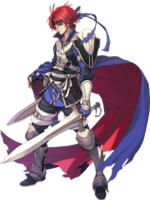
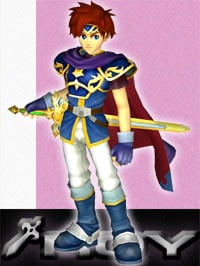
![Roy [Classic Mode] trophy](https://ssb.wiki.gallery/images/thumb/f/f6/Roy_Trophy_Melee.png/70px-Roy_Trophy_Melee.png)
![Roy [Smash, Adventure Mode] trophy](https://ssb.wiki.gallery/images/thumb/b/bd/Roy_Trophy_%28Smash%29.png/69px-Roy_Trophy_%28Smash%29.png)
![Roy [Smash, All-Star Mode] trophy](https://ssb.wiki.gallery/images/thumb/e/e7/Roy_Trophy_%28Smash_2%29.png/83px-Roy_Trophy_%28Smash_2%29.png)
